
Transcription
OPEN LETTER TO GOVERNOR CHARLIE D. BAKER
AND
SENATOR WILLIAM N. BROWNSBERGER
COMMONWEALTH OF MASSACHUSETTS
STATE HOUSE
BOSTON, MASSACHUSETTS 02133
In Re: Commutation and Parole Procedures
May 28, 2018
Dear Governor Baker,
and Senator Brownsberger;
GREETINGS!!
I am writing on this occasion about the commutation petition and how it is processed for the past 3 years, where the applications for individuals serving a 1st degree life sentence have a very difficult time with the process. - I am using my personal experience, which is a reflection of many other individuals serving a 1st degree life sentence in Massachusetts.
Please note that 65 1st degree lifers applied for a commutation review, because of the statements made by Governor Patrick a few months before he left office. Nothing was done on that regard. However some of us received a notice indicating that is we want to process our application under the Commutation Guidelines of former Governor, or if we want to pursue the same application under Governor Baker's New Guidelines.
It is important that you be aware that myself and several other applicants made the notification of our interest to be reviewed under the present Governor's Guidelines. Attached to this letter you will find (Exhibit-A), which is the copy of the documentation that was filed at that time, including my commutation petition.
It seems to me that the applications for many of us have been stockpiled on the desk of someone at the Parole Board. - Without any question the Massachusetts Parole Board has extraordinary power, they can practically do anything they want, including holding a personal grouch. Parole is a privilege not a right, and they can use any prerogative as a discretionary decision to deny parole to anyone, because parole appeals have no success regardless of what it is.
I want to take this opportunity to relate some of the untold anecdotes from when I was being returned from my escape over 42 years ago. I travelled from Mexico City to Browsville, Texas, for 1 1/2 days in a trunk of a car. Every few hours we stopped to rest, they opened the trunk, slapped me around, punched me in the head, gave me a soda and a sandwich and put me back in the trunk of the car again. Occasionally they didn't slap me but strongly shook me and let me use the bath room.
I thought that I was going to get shot by the Mexican Transportations Dept., but I survived and escape from the County Jail for a couple hours. The authorities there never charged me with the escape but offered me a transfer to Florida, under another name and I agreed with the extradition. I was closer to my family and I pleaded guilty to charges there so that I could stay in Florida, but they relinquished jurisdiction, filed the charges and returned me back to face Massachusetts Criminal Justice System.
Upon arrival at MCI-WALPOLE, I noticed that murder, stabbing and assaulting prisoners was in full swing and I began contacting the United Nations so that I could obtain a copy of the adopted Standard Minimum Rules for the Treatment of Prisoners. (See Exhibit-B).
I spend 1 1/2 years painting the entire block where I was living with flags surrounded by flowers and poems on each floor. I couldn't fight the "Friendlys" directly because I could get killed. _ (I called "Friendlys" those gangster who had a corrupt relationships with prison administrators, while on the other hand they were having people killed, hurt or being set-up).
I made contact with Senator Jack Backman and we agree with the idea of creating jobs paying minimum wage, it was very possible that those jobs would reduce the violence and murder rate of that facility. (See Exhibit-C). Suddenly there were two back to back murders on my block and no one said anything. Only the "Friendlys" among ourselves playing a tough role for the execution squad or the wrecking crew, justifying the killing.
I kept myself working, and going to school away from the block waiting for the approval of a federal transfer, when I was approached by a latino "Friendly" who worked for the captain in charge of security, and he told me that he wanted to buy my typewriter, I told his "NO", days later I found out that there was in fact an investigation initiated by federal people and the person who tool the package to mail, a bomb was mailed from the prison and re-mailed from the street. My typewriter was secretly used while I was out of my cell to type the label of the bomb. Neither my typewriter or myself appear on the evidence list. If I would harm the "Friendly" I would it have a double problem (See Exhibit-D).
Years later I read on the newspaper the story of Bulger, Flemmi and "Friendlys" other gangsters from the same prison connection who were inducted into the (Cosa-Nostra), the so-called mafia working with the FBI, State Police and Officials from the Department of Correction. At that moment everything was clear to me and I understand the functions of the friendly's in prison.
Through our lifetimes and for the most part older prisoners learned from mistakes because our conscience help us to correct mistakes.. I have made bad mistakes for what I am accountable with great remorse, but those who keep on making mistakes on purpose, lost their conscience for good, there is no repair for them.
CONCLUSION
Governor Baker,
and Senator Brownsberger,
I am hoping that somehow you have read my mail and that my writing illustrate the complex problems that are blinding those individuals in power because of the large amount of money being invested in the Criminal Justice System.
Between my incarceration, medical treatment, court, appeals, lawyers, college education, and my family on welfare for many years, I am a $2.1 million dollar package - - I am a poor millionaire; with the exception of my daughter, and grand children, I lost my entire family during my incarceration of 47 years; slowly little-by-little I am dying in prison. I am thinking about the fact that I am a property value of the Department of Correction, who is helping on the cost of keeping correctional staff on their jobs and nothing more.
The real phenomenon is in some ways an artefact of the death penalty. The State Holders and opponents of capital punishment have promoted life sentences as an alternative to execution, and as the Nation's enthusiasm for the death penalty wanes amid restrictive Supreme Court Ruling and a spate of death row exoneration, more states like Massachusetts are turning to life sentence.
Respectfully yours,
Luis Perez W33937
NCCI - GARDNER
500 Colony Rd., P.O. Box 466
Gardner, Massachusetts 01440
EXHIBITS-A
The Commonwealth of Massachusetts
Executive Office of Public Safety & Security
Department of Correction
50 Maple Street, Suite 3
Milford, MA 01757
Tel: (508) 422-3300
www.mass.gov/doc
CHARLES D. BAKER
Governor
KARYN E. POLITO
Lieutenant Governor
DANIEL BENNETT
Secretary
THOMAS A. TURCO III
Commissioner
JOHN A. O'MALLEY
Chief of Staff
PAUL DIETL
BRUCE I. GELB
MICHAEL G. GRANT
CAROL A. MICI
Deputy Commissioners
December 1, 2016
Dear Mrs. D'Acri:
Your letter to Governor Baker requesting a commutation for Luis D. Perez, W33937 has been referred to me for response.
In order to be eligible for a commutation, Mr. Perez is statutorily required to complete an application and submit it to the Governor's Council. Mr. Perez may contact his assigned Correctional Program Officer (CPO) to request a copy of the application.
If you have any questions about the commutation process, please contact:
Julie Pease, Executive Clemency Coordinator
Parole Board
12 Mercer Road
Natick, MA 01760
I trust this addresses your concerns.
Sincerely,
Christopher Fallon
Director of Communications
cc: Collette Gogven, Superintendent
Luis D. Perez, W33937
File (16267)
Luis Perez W33937
NCCI - GARDNER
500 Colony Rd., P.O. Box 466
Gardner, Massachusetts 01440
December 8, 2016
Mr. Christopher Fallon
Director of Communication
Executive Office of Public Safety
Department of Correction
50 Maple Street - Suite 3
Mildford, Mass. 01757
Dear Mr. Fallon;
GREETINGS!!
This is to acknowledge the receipt of your letter dated December 1st, 2016. Please note that my application was properly filed back on April 22, 2016. The citizens who are supporting my freedom had knowledge of my commutation being filed, it was also acknowledge by Ms. Julie Pease, The Executive Clemency Coordinator who indicated that my application was taken upon request under the new Guidelines for Pardons and Commutation.
Enclosed please find a copy of my petition for future reference. Thank you for your time and consideration in this matter.
Respectfully yours,
Luis Perez W33937
cc: Colette Goguen (Superintendent)
NCCI - GARDNER.
Ms. Julie Pease
Executing Clemency Coordinator
Parole Board.
File (1626).
COMMONWEALTH OF MASSACHUSETTS
COMMUTATION PETITIONS
To His Excellency the Governor:
I, LUIS PEREZ - PRISONER I.D. #W-33937
Having been convicted of the crime of Murder 1st Degree, Armed Robbery, Arson and Larceny of a Motor Vehicle for which I was sentenced on January 23rd, 1973, in the Middlesex County Superior Court to serve a term of Life Sentence & 10-20 years Concurrent, do hereby petition for a commutation of the sentence imposed for said crime, either absolute or upon such condition and limitations as may be deemed proper.
(Signature of petitioner)
LUIS PEREZ - W33937 /NCCI-GARDNER
P.O. Box 466, Gardner, Mass. 01440
(Address)
June 21st, 1951
(Date of Birth)
I am petitioning for a commutation for the following reasons: If applicable, please explain why your petition falls within the Executive Clemency Guidelines
Dead by Incarceration is contradictory to "The Convention Against Torture and Other Cruel, Inhuman or Degrading Treatment or Punishment, this International Triety was adopted by the U.S. and open for signature Dec. 10, 1984, G.A. res. 39/46 (annex, 39 U.N. GAOR Supp. (No.51) at 197), U.N. Doc. A/39/51 (1984) (entered into force June 26, 1987; for the United States April 18, 1988) (Convention Against Torture or Convention).".....
- SEE NEXT PAGE ATTACHED TO THE PETITION -
(If more space is needed, please attach additional sheets.)
Return to Executive Secretary, Room 184, State House, Boston, MA 02133
THE SECOND CHANCE ACT BECOMES LAW IN THE UNITED STATES
The Second Chance Act was signed into law by President George W. Bush on April 9, 2008 and enjoyed broad bipartisan support and passed by unanimous consent.
The President stated at that time that;
The country was built on the belief that each
human being has limitless potential and worth.
"Everybody matters."
The Massachusetts Parole Board has issued regulations governing aspects of how it functions in its capacity as the Advisory Board of Pardons Pursuant to 120 C.M.R. 900-902; The Parole Board is directed by the Governor's Pardon and Commutation Guidelines in its consideration of petitions for Executive Clemency. 120 C.M.R. 900.01 (2). Within the New Guidelines Governor Charles D. Baker is very much aware of the International Treaties and The Second Chance Act of 2008.
The petitioner Luis Perez W33937 is seeking the opportunity to obtain a hearing to express his remorse and have the opportunity to demonstrate that he is in fact a good candidate for commutation and that he meet the criteria in question by the New Guidelines. - The Petitioner have served more than four decades since he was arrested. Even-though good time does not apply to individuals serving a life sentence, I have accumulated more than 15 years between statutory and earned good time.
Respectfully yours,
Luis Perez W-33937 (Petitioner)
DATED: April 22, 2016
CC: CHARLES D. BAKER
GOVERNOR
Executive Department
The Commonwealth of Massachusetts
State House, Boston, Mass. 02133
File.
U.S. Department of Justice
Executive Office for Immigration Review
Decision of the Board of Immigration Appeals
Falls Church, Virginia 22041
File: A17 722 600 - Concord
Date: OCT 23 2000
In re: LUIS DEMETRIO PEREZ-SANCHEZ
IN REMOVAL PROCEEDINGS
APPEAL
ON BEHALF OF RESPONDENT: Pro se
ON BEHALF OF SERVICE: Richard G. Buyniski
Assistant District Counsel
John M. Furlong, Jr.
Assistant District Counsel
EXHIBIT
CHARGE:
Notice: Sec. 212(a)(2)(A)(i)(I), I&N Act [8 U.S.C. 1182(a)(2)(A)(i)(I)] - Crime involving moral turpitude
APPLICATION: Relief under the United Nations Convention Against Torture
In a decision dated April 11, 2000, an Immigration Judge found the respondent subject to removal as charged above, but granted the respondent's application for deferral of removal under the United Nations Convention Against Torture. The Immigration and Naturalization Service has appealed. The appeal will be dismissed.
The respondent is a 49-year-old male, native and citizen of Cuba. The record reflects that the respondent was granted political asylum in Mexico on October 6, 1966, shortly after his departure from Cuba. The respondent was admitted to the United States as a lawful permanent resident on April 16, 1967. The record further reflects that on January 23, 1973, the respondent was convicted in the Middlesex Superior Court at Cambridge, Massachusetts, for murder in the first degree and sentenced to life imprisonment. Removability is not an issue. The Service argues that the Immigration Judge erred in determining that the respondent has met his burden of establishing entitlement to deferral of removal under the Convention Against Torture.
A17 722 600
We affirm the decision of the Immigration Judge insofar as it finds that the respondent has established eligibility for deferral of removal under the Convention Against Torture(1), for the reasons set forth in that decision. See generally Matter of Burbano, 20 I&N Dec. 872 (BIA 1994). We agree that the testimony and evidence of record meet the respondent's burden of showing that it is more likely than not that he will be "tortured" if removed to Cuba, as that term is defined in the regulations. See 8 C.F.R. 208.17 (2000); Matter of S-V-, Interim Decision 3430 (BIA 2000). We add the following.
The findings of an Immigration Judge regarding matters of credibility are ordinarily given significant deference, since an Immigration Judge hears an applicant's actual testimony and is in the best position to observe an applicant's demeanor. See, e.g., Matter of Burbano, supra, Matter of Kulle, 19 I&N Dec. 318 (BIA 1985), aff'd, 825 F.2d 1188 (7th Cur. 1987), cert. denied, 484 U.S. 1042 (1988). Moreover, we find that the Immigration Judge's favourable credibility determination in this case is supported by the record. See Matter of A-S-, 21 I&N Dec. 1106 (BIA 1998). The Service argues on appeal that the respondent has failed to provide adequate corroborating evidence to support his claim. More specifically, the Service submits that the respondent failed to independently corroborate any connection between himself and an organization known as "Cuban Representation in Exile" - a critical aspect of his claim(2). In this regard, the Service notes that respondent's request for information from the Central Intelligence Agency (CIA) resulted in a written response reflecting that the CIA had no record or information relevant to the respondent's inquiry. However, the response from the CIA (Exhibit 7), dated May 8, 1986, goes on to indicate that many records maintained by the agency concerning foreign intelligence surveillance remain classified and, therefore, the response in question should not be construed "as either confirming or denying the existence of FISA (Foreign Intelligence Surveillance Court) records within the scope of the [respondent's] request." We are satisfied that the failure to provide this particular type of independent evidence is excusable under the circumstances of this case. See Matter of S-M-J-, 21 I&N Dec. 722 (BIA 1997) (necessity of corroborative evidence when available). Moreover, the respondent's claim in this case comports with known country conditions as reflected in the ample and reliable documentary evidence of record. An applicant's testimony alone may be sufficient to sustain the burden of proof without corroboration if credible in light of known general conditions in the applicant's country of nationality. See generally, 8 C.F.R. 208.13(a) (2000). We have reviewed the arguments made by the Service on appeal, and do not find that they present any reason to disturb the decision of the Immigration Judge. Accordingly, the appeal will be dismissed.
1 Convention Against Torture and Other Cruel, Inhuman or Degrading Treatment or Punishment, adopted and opened for signature Dec. 10, 1984, G.A. res. 39/46 (annex, 39 U.N. GAOR Supp. (No. 51) at 197), U.N. Doc. A/39/51 (1984) (entered into force June 26, 1987; for the United States Apr. 18, 1988)(Convention Against Torture or Convention).
2 The respondent claims to have been affiliated with this Florida-based organization which sponsored infiltration raids into Cuba, and which, according to the respondent, was occasionally financed by the Central Intelligence Agency.
A17 722 600
ORDER: The appeal is dismissed.
[signature]
FOR THE BOARD
Second Chance Act becomes law
features
1 Understanding the Second Chance Act
Five years of advocacy made the Second Chance Act a reality. What is it and who does it affect?
6 Crack hearings continue on Capitol Hill
Will Congress act to correct unjust crack cocaine laws?
8 Steps for filing a commutation petition
We show you the right moves for filing an effective commutation petition
13 Mothers speak out
Four Massachusetts mothers urge other families to work with them for reform
departments
6 Federal news
10 Litigation
13 State news
16 Is justice being served?
19 FAMM outreach
SUMMER 2008
ISSUE 2 I VOLUME 18
THE SECOND CHANCE ACT, legislation designed to aid formerly incarcerated people coping with the challenges of re-entry, was signed into law by President George W. Bush on April 9. Lawmakers from across the political spectrum and representatives from many of the advocacy groups who worked for more than five years to see this important legislation become law packed the signing ceremony in Washington.
"The country was built on the belief that each human being has limitless potential and worth. Everybody matters," said Bush during the signing ceremony. "We believe that even those who have struggled with a dark past can find brighter days ahead. One way we act on that belief is by helping former prisoners who've paid for their crimes - we help them build new lives as productive members of our society."
Championed by Representatives Danny David (D-Ill.) and Chris Cannon (R-Utah) and Senators Joseph Biden (D-Del.), Arlen Specter (R-Pa.), Sam Brownback (R-Kan.), and Patrick Leahy (D-Vt.) the Second Chance Act enjoyed broad bipartisan support and passed by unanimous consent.
But what exactly does the Second Chance Act do and who does it affect? To answer those questions, FAMM analysed the new law and put together answers to the most frequently asked questions.
OFFICE DES NATIONS UNIES A GENEVE
CENTRE POUR LES DROITS DE L'HOMME
UNITED NATIONS OFFICE AT GENEVA
CENTRE FOR HUMAN RIGHTS
Palais des Nations
CH - 1211 GENEVE 10
Telefax: (022) 733 98 79
Telegrammes: UNATIONS, GENEVE
Telex: 28 96 96
Telephone: 734 60 11 731 02 11
G/SO 215/1 USA
REF. No:
(a rappeler dans la reponse)
11 February 1992
Your communication
dated 7 October 1991
Dear Mr. Perez,
This is to acknowledge the receipt of your communication referred to above, the contents of which have been noted.
Yours sincerely,
Jakob Th. Moller
Chief, Communications Section
Centre for Human Rights
Mr. Luis Perez
P.O. Box 466
UNITED NATIONS NATIONS UNIES
POSTAL ADDRESS - ADRESSE POSTALE: UNITED NATIONS, N.Y. 10017
CABLE ADDRESS - ADRESSE TELEGRAPHIQUE: UNATIONS NEWYORK
EXECUTIVE OFFICE OF THE SECRETARY GENERAL
CABINET DU SECRETAIRE GENERAL
EXHIBIT-B
REFERENCE:
5 June 1980
Dear Mr. Perez,
In the absence of Mr. Rohan on official travel abroad, I would like to acknowledge your letter of 21 May 1980.
Your concern about the procedures implemented in the Correctional Institution of Walpole were noted. As you know, one of the purposes of the United Nations is to achieve international co-operation in promoting human rights and fundamental freedoms for all without distinction as to race, sex, language or religion. Since its founding, the Organisation has drawn up and urged support for many human rights instruments.
While matters such as the one raised in your letter fall under the internal jurisdiction of each State, the United Nations has adopted Standard Minimum Rules for the Treatment of Prisoners of which I attach a copy. I am also enclosing a working paper on the treatment of offenders with special reference to the implementation of the Standard Minimum Rules.
You might find this information helpful, as it tells you about the work of the United Nations to improve correctional practice.
Yours sincerely,
Angela Knippenberg-Uther
Second Officerr
Mr. Luis D. Perez
Box 100
So. Walpole, Mass.
EXHIBIT-C
COMMONWEALTH OF MASSACHUSETTS
MASSACHUSETTS SENATE
STATE HOUSE, BOSTON, MA 02133
SENATOR JACK H. BACKMAN
SECOND MIDDLESEX-NORFOLK DISTRICT
TEL. 727-7295
CHAIRMAN
COMMITTEE ON HUMAN SERVICES AND ELDERLY AFFAIRS
CHAIRMAN
COMMITTEE TO INVESTIGATE SECLUSION, RESTRAINT AND DEATHS IN STATE SUPPORTED FACILITIES
May 21, 1980
Luis D. Perez
Box 100
South Walpole, Massachusetts 02071
Dear Mr. Perez:
Thank you for your letter regarding corrections legislation. I am enclosing copies of S. 625 and S. 627, as well as summaries of all of the corrections legislation that was referred to the Human Services Committee this year. Please note that S. 627 was redrafted by the Human Services Committee. The redrafted bill, S. 2045, would create a pilot program in one correctional institution, in which inmates would be paid the minimum wage.
I have also enclosed a copy of the budget for the Department of Correction that was passed by the House of Representatives, as well as the Senate Ways and Means Committee's corrections budget, for Fiscal year 1981, which starts on July 1, 1980. The full Senate will act on the Senate Ways and Means budget on Wednesday, May 20, and will probably make some amendments. Then a conference committee will reconcile the differences in the House and Senate versions.
If I can be of any further help, please contact me.
Sincerely,
Jack H. Backman
JHB:mk:jm
Enclosures
EXHIBIT D
U.S. Department of Justice
United States Attorney
District of Massachusetts
1107 J.W. McCormack Post Office and Courthouse
Boston, Massachusetts 02109
October 21, 1981
Raymond E. Gillespie, Esq.
31 State Street
Boston, Massachusetts 02109
Re: United States v. Chamorro, Criminal No. 81-181-Z
Dear Mr Gillespie:
Please be advised that the Government will not-call Luis Perez as a witness in the above-styled case. The typewriter which has been identified as having been used to write the address label on the bomb parcel, is the property of Mr. Perez and was taken from his cell on or before May 14, 1981. Mr. Perez has denied typing the address label and has indicated that Mr. Chamorro told Mr. Perez that he, Mr. Chamorro, used Mr. Perez' typewriter to type the address label on the bomb parcel without Mr. Perez' permission.
Very truly yours,
EDWARD F. HARRINGTON
United States Attorney
By: [signature]
ROBERT B. COLLINGS
First Assistant U.S. Attorney
Chief, Criminal Division
U.S. Vs Chamorro
687 F. 2d 1 (1st Cir. 1982)
10**** LAWRENCE EAGLE TRIBUNE, Lawrence, Mass. - Thursday September 8, 1983
Inmate sues to be jailed here
Involved in Lawrence case
By Jim MacLaughlin
Eagle-Tribune Writer
LEWISBURG, Pa. - A federal inmate is suing both Massachusetts and federal prison authorities in connection with the pipe bombing of a Hispanic club in Lawrence more than two years ago.
Luis D. Perez, formerly of Lowell and now an inmate of the U.S. Penitentiary in Lewisburg, said his life is in danger, and prison officials are not only aware of that danger but are doing little to help him.
In May of 1981 a package addressed to Pablo Santiago Sr. arrived in the mail at Pavi's Spanish Paradise, a restaurant and club on Water Street in Lawrence.
Santiago was in New York at the time. When a patron attempted to open the package it exploded, injuring the man and sending him to the hospital.
In October of 1981, a federal jury convicted another Lawrence man, Serglo Chamorro, then 33, of constructing the bomb and sending in from inside Walpole State Prison.
At the time, Chamorro was serving six to 10 years for trying to kill a third Lawrence man. Postal inspectors said the bomb was an act of revenge because Santiago had testified against Chamorro.
Perez, also a Walpole Inmate at the time, told prison officials that Chamorro used his typewriter to address the package label.
Fearing Chamorro's revenge, Perez said he immediately requested a transfer to the federal prison system. He was first placed in the state prison in New Hampshire, and then sent to federal prisons in Leavenworth, Kansas, Terre Haute, Indiana, and now Lewisburg.
Each time, Perez said other Walpole inmates followed, and they know him "and are very aware of Chamorro's case."
In a letter to the Massachusetts Department of Corrections dated Aug. 8, Perez said: "Directly or not, my present situation and concern are caused by your administration by sending inmates (to Lewisburg) who represent a potential threat to my life."
At his request, Perez has been in a segregated cell in Lewisburg since May. He has asked to be returned to the Massachusetts prison system. In July he was told that he would have stay where he is, but would be re-evaluated in six months.
In the civil suit, filed in U.S. District Court in Boston, Perez says that his prolonged incarceration in a segregation cell for 23 hours a day is "warehousing" and "cruel and unusual punishment."
Perez asks a court to order that he be returned to Massachusetts or another state prison where he can serve his time "in a neutral environment."
He also asks that officials be prevented from harassing him and that he be compensated with $50,000 from each of four person names in the suit.
Other posts by this author
|
2023 feb 2
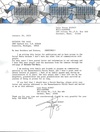
|
2022 dec 26

|
2022 nov 5

|
2022 aug 23
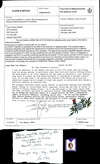
|
2022 jun 23
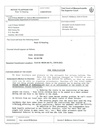
|
2022 may 4
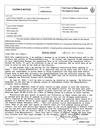
|
More... |
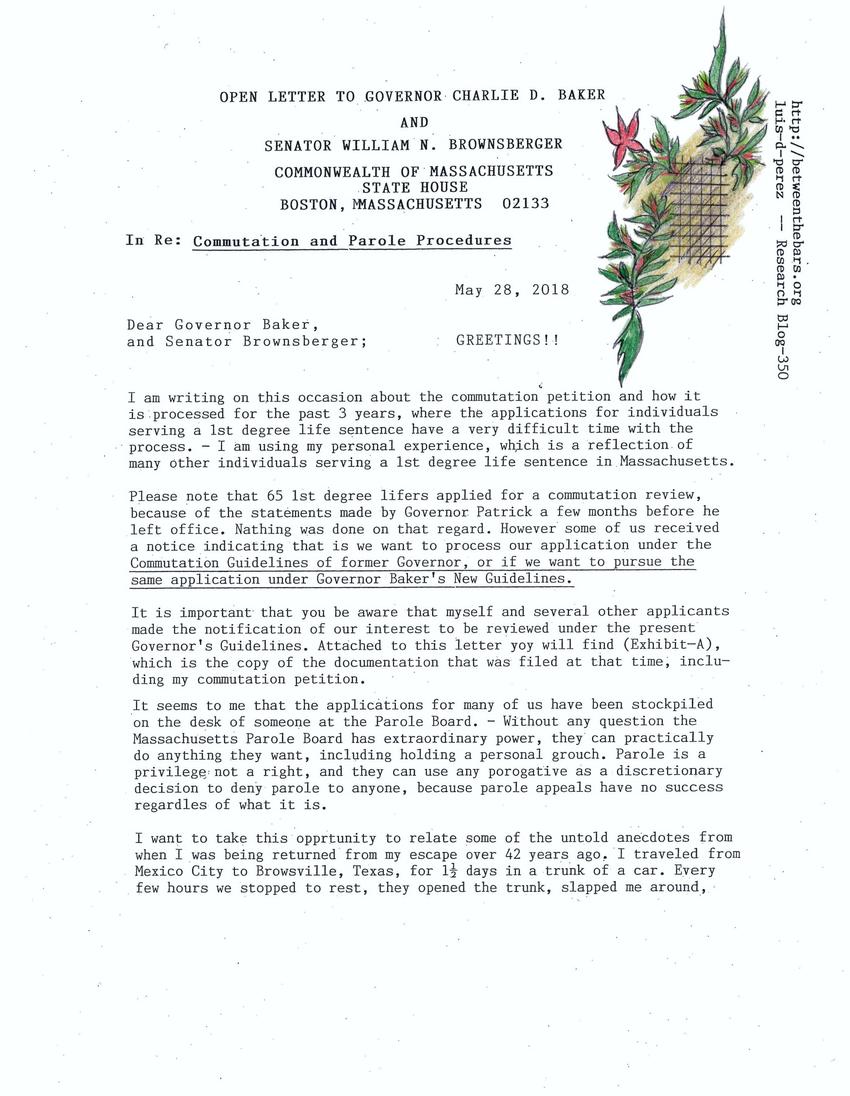
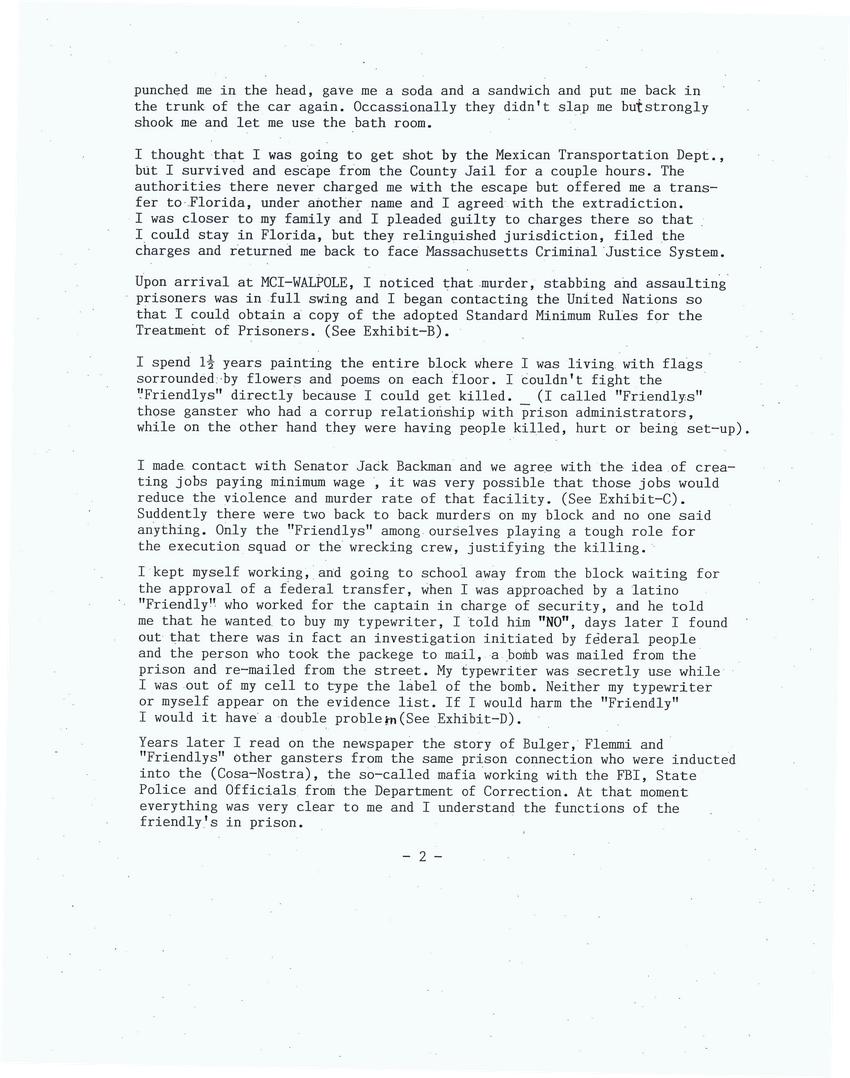
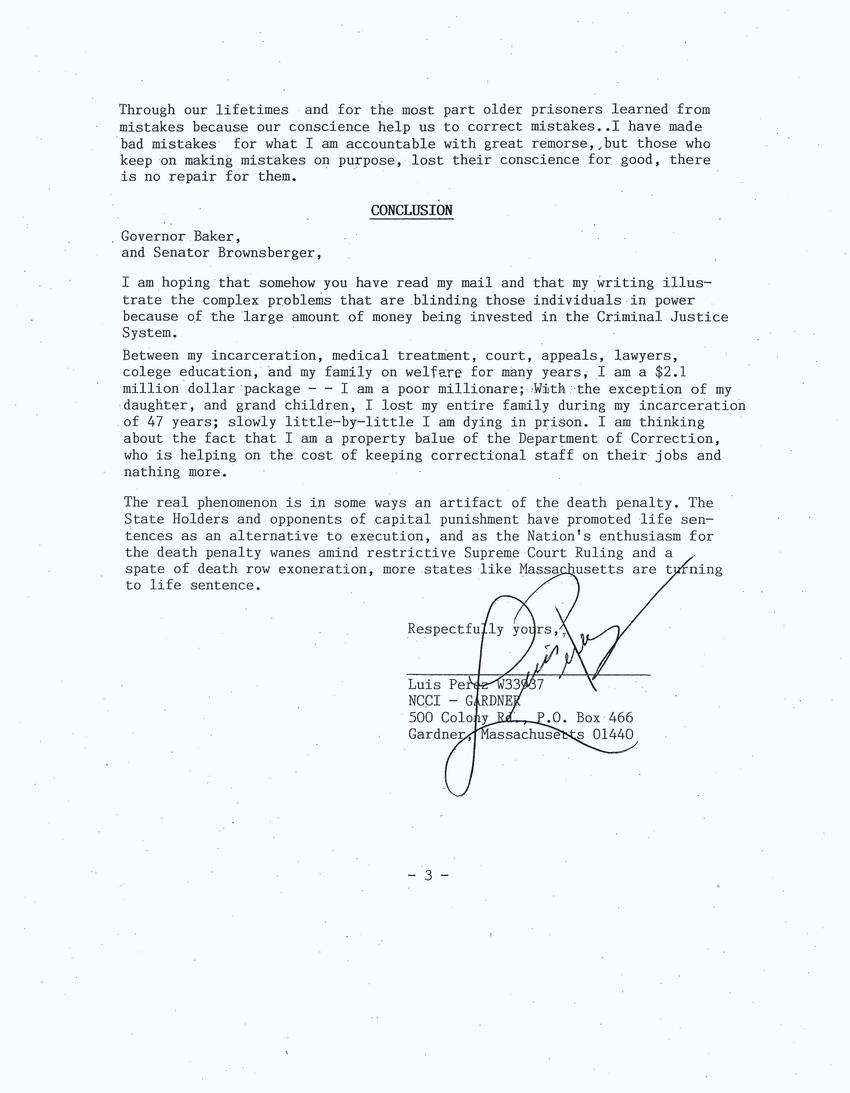
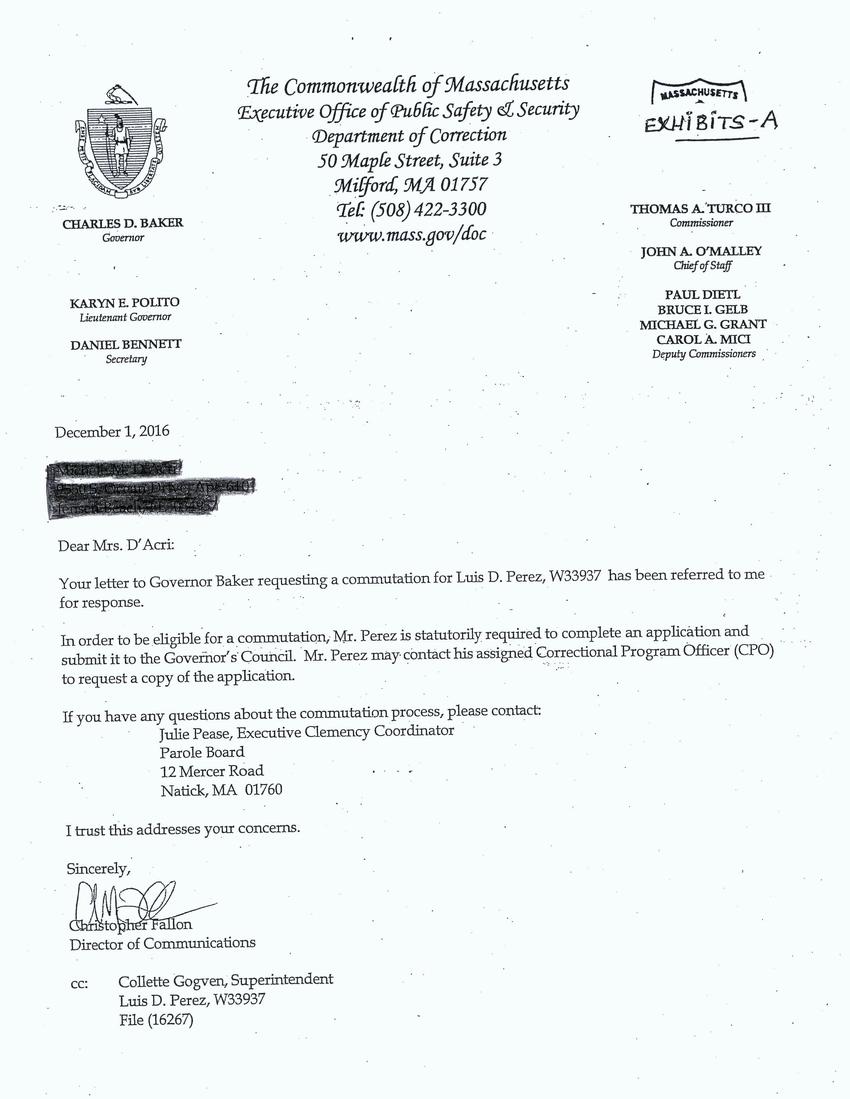
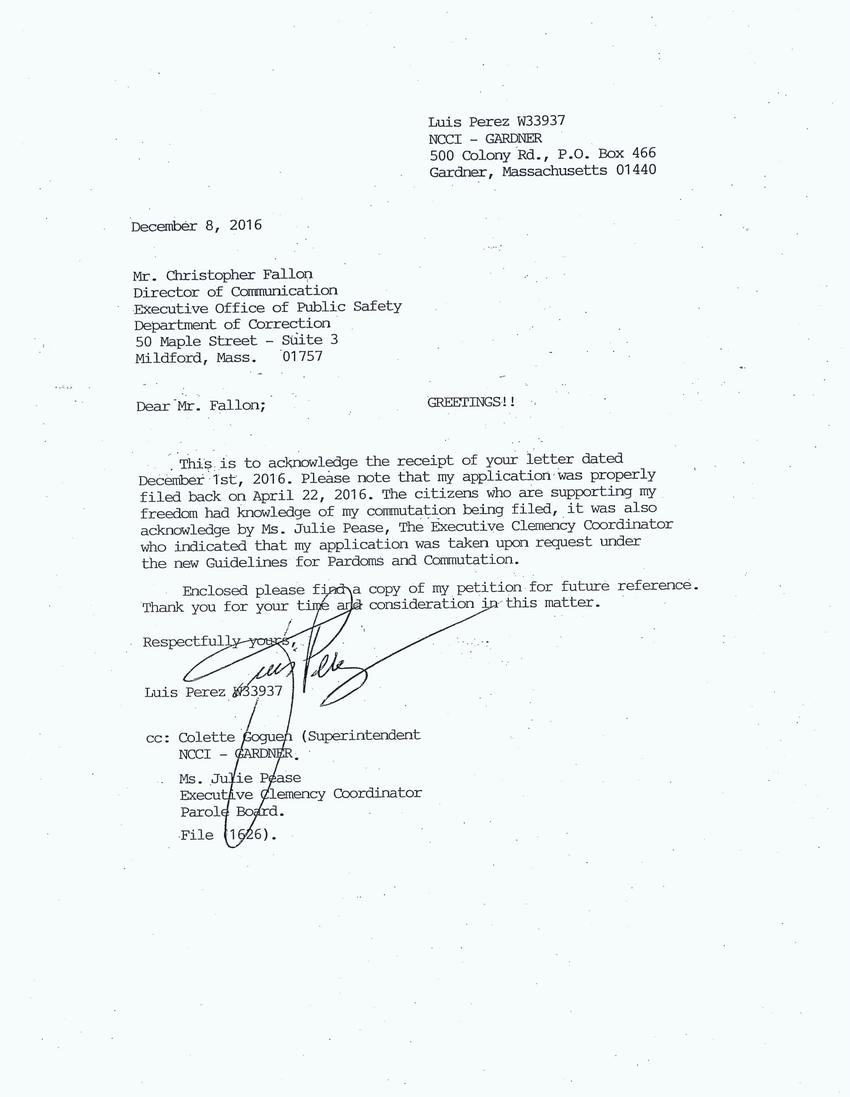
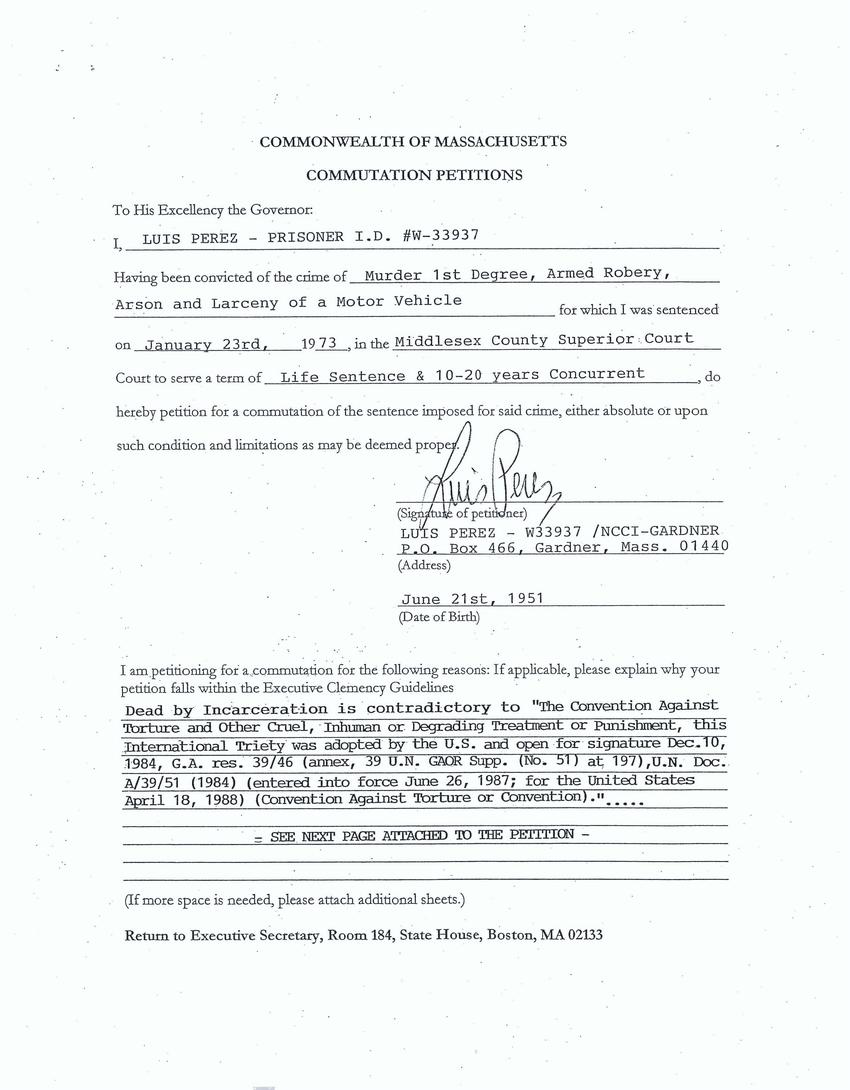

Replies